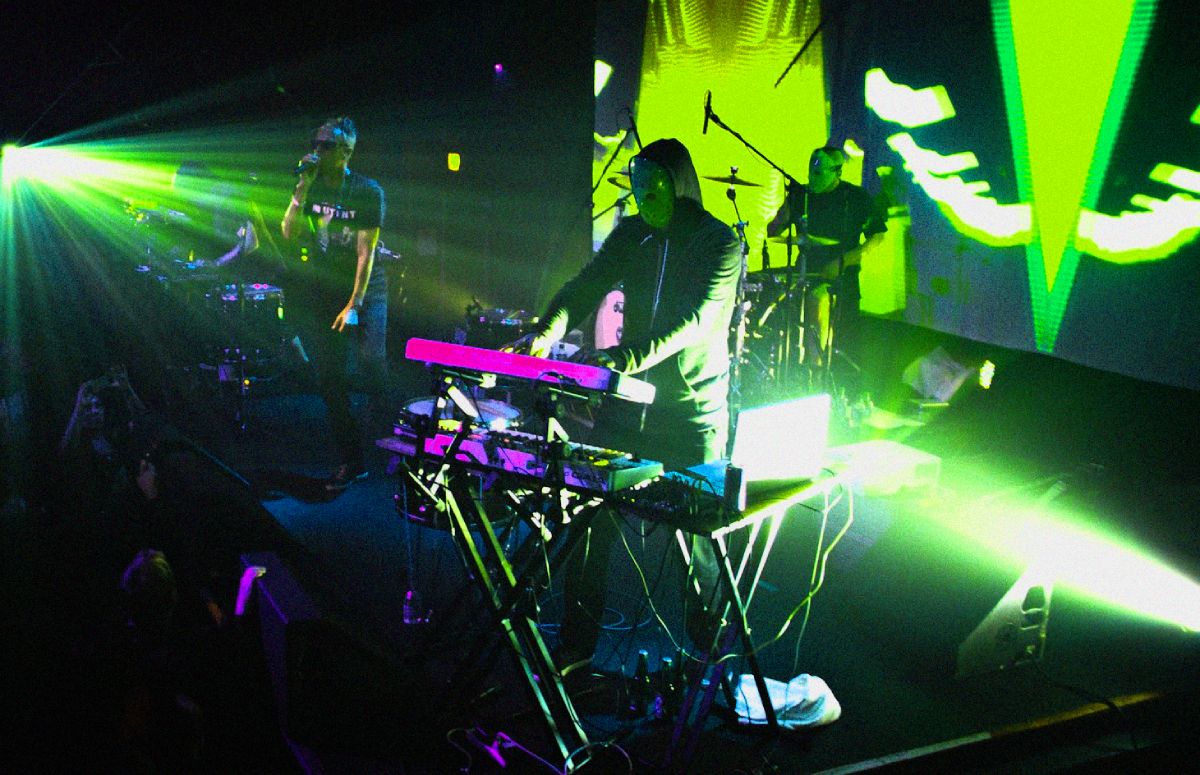Front Line Assembly and their new album 2021 as an occasion to commemorate industrial and its meaning
Содержание
At the beginning of 2021 Front Line Assembly pleased us with a new album "Mechanical Soul". For the coryphaeans of electro-industrialism, composing this album in the Year of Self-Isolation was not difficult - they are already skilled at working remotely, between Canada, USA and Austria, compiling beats and samples into what is called by the pretentious term "industrial".

Industrial is a complex music with a complex history. By and large, it is not even music, but a complex of multimedia projects that carry a pathos-like meaning, the elements of which are not only sound (that's right - not "music", but "sound"), but also video clips, stage actions, symbolism, provocative texts and, of course, the author's ideology. Not to entertain the consumer like pop (although all music ultimately serves this purpose), not to inspire him to some social postures like rock (including metal), not to influence the structure of behaviour like electronic music (from ambient to all kinds of dances), but to create a certain mood, a specific sensual attitude to the surrounding reality. That's why industrial, which shone in the 1980s and 90s and is now almost extinct, was initially incredibly eclectic. Complex symphonic structures, pop danceability, rumbling electric guitars, unnatural sound effects (recorded in factories or urban environments - hence the name) - everything is linked into a single sensual space. The main thing in industrial is to reveal the modern social environment as non-natural, extra-natural, anti-natural, and, as a consequence, non-human and anti-human. Culture, detached from nature, turns into its opposite. The way of life, alienated from naturalness, turns into anti-life. Man turns into a self-similarity, a simulacrum, a fantastic golem living in the environment of plastic, reinforced concrete, information and noise. All values and norms of behaviour have long lost their original meaning - to adapt to the natural and social environment, to adapt and survive. Today man is something different and even the opposite of what he was at the emergence of civilisation. This post-, anti-, pseudo-human nature with its new system of coordinates and radically transformed system of values is the space that is explored (and shaped?) by industrialism.

The roots of industrial are hard to trace. On the one hand, it is the rock movement in its degeneration: all postpunk, new wave, kraut, even synthpop. On the other hand - electronica, from the roof-raising experiments of Stockhausen to the gloomy outsider of Detroit techno. The main thing is to create fundamentally synthetic, unnatural music (for the synthetic posthuman). Industrialists did not shy away from transforming music from a spontaneous sonic flow into a calculated combination of sounds and rhythms. And almost always heavy and aggressive - at the very edge of the listener's endurance (not to mention the unbearable nightmare of the Japanese noise-makers). Industrialists tried to overcome what music as such is based on - the dialectical contradiction of harmony and rhythm. Now pure tuning is the goal of sound. That's why instead of studio recording of guitar and processing it on multi-storey equalisers industrialists dissected the recorded guitar sound into constituent elements and used them like piano keys. And what they did with the computer sound, bringing it to the semblance of robot speech, the battle of the machines!... Special importance was always given to vocals - they had to be different from the whole repertoire of "natural music" - the squeals, squeaks and wheezes of infernals, the growling or grave bass of shamans, the recitative mumbling of alien cyborgs.
The visuals of Industralians could not be surpassed by anyone else - especially the stage productions. Compared to gut-wrenching on stage (Skinny Puppy), burning colleagues and pseudo-cohabitation with them (Rammstein), truly satanic rituals (Coil) bordering on pornography (Mushroomhead), the antics of Zappa or Alice Cooper are just a kindergarten matinee. Not just to shock, but to change consciousness - that's the main thing here! And the music videos... I've never seen anything scarier and at the same time more profound than those of ohGr (ex-Skinny Puppy).
From the very beginning industrial music was divided into two main, not clearly defined directions: rock and electronic. Ministry (one of the founders), Rammstein, Marilyn Manson, Rob Zombie are bright representatives of the first one for mass consumers, the second one - Genesis P-Orridge (recently deceased by Cthulhu), Coil, Skinny Puppy, Haujobb, Aghast View, Laibach. Others are known for manoeuvring in the middle: Einstürzende Neubauten, Nine Inch Nails, Die Krupps, KMFDM. The activities of the Austro-Canadian-American project Front Line Assembly belong to this intermediate category.

The project was created by Bill Lieb, who left Skinny Puppy in the late 1980s in search of a more succinct and mass-orientated sound. FLA immediately formed its own sonic face - it is rooted in electronic rhythmic sound with all kinds of new-fangled and "classic" effects, from shoegaze to IDM and EBM. To this are carefully added sampled guitars, and most importantly - plenty of rumbling rock drums. The resulting compositions are full of polyrhythms, noises, different changes, shakes and flashes. Front Line Assembly are a bit like the more popular (and pop) KMFDM, but they don't have the deliberate danceability of those. Instead, there's a complex musical structure that illustrates the musicians' thorough computer literacy. In general, this is a vicious line, in my opinion, - it allows you to create in the quiet of the night, isolated by headphones and strong coffee from the sinful world of this, endless monotypical releases, in which the same effects are moulded into various combinations of rhythmic old-school sound, laced with periodic injections of metal drive and the trademark grinding vocals. Melodicism is close to zero, rhythmicity is tiring, and floo (in the spirit of 90's raves) is annoying in general. That's why industrial has degenerated in our time, giving up the two-wave field to all kinds of "new waves" of metal and revived synthpop, and the rhythmic field to more media, loud and creatively barren DJs.

This is exactly the fate of Front Line Assembly, a prolific but terribly monotonous ensemble. The measured production of one and the same sound product was broken only once - with the release of the stunning album "Echogenetic" (2013), which successfully experimented with the integration of new-fashioned chips from dubstep, fuchebass, glitch and synthpop into industrial. The album turned out to be inspired and oriented to a wider audience than the aging sysadmins of village administrations who are faithful to their institute preferences.

But the current album "Mechanical Soul" is different. On the one hand, it's quite old-fashioned, on the other hand, it looks quite defiant against the background of all the "neo-soul", "neo-r'n'b", "artpop", "inditronics" that make up the current music industry. Now, perhaps, the surprised millennials will start to "reinvent" industrial again - but, as always, in more tedious, pitiful and idle forms. "Mechanical Soul" is not only one of the next albums for loyal fans. It's a great excursion into the history of industrial (both as an atmospheric-experimental musical direction, as a man-hating ideology, and as an infantile-escapist party). But "corrected for modernity": all the same, the current technologies, musical fashions and social transformations leave their imprints on the sound, not allowing it to be closed into bare retro. The existence of such music today is a question-call from the 2000s: "Have we reached? What have we come to, posthumans? Have we built a fair society of reasonable consumption and environmental protection?...".
Tracks
"Purge."
"Glass and Leather."
"Unknown."
"New World."
"Rubber Tube Gag."
"Stifle."
"Alone."
"Barbarians."
"Komm, stirbt mit mir."
"Time Lapse."
"Hatevol" (Black Asteroid Mix)
Author - Kirill Kungurtsev



